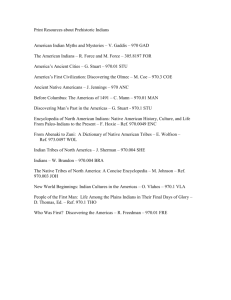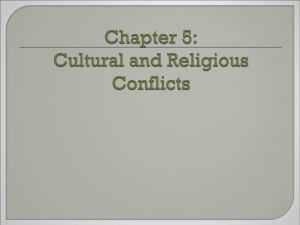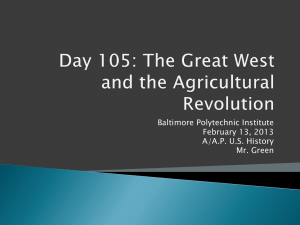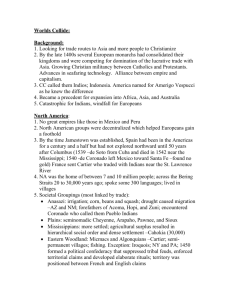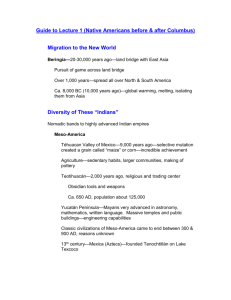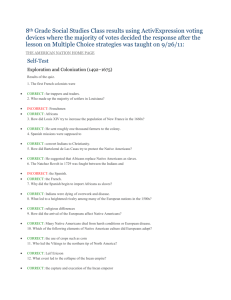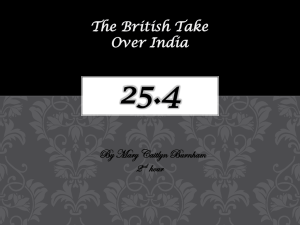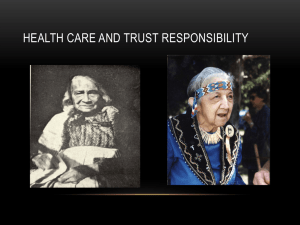The Death of an Environmental Friendly Nation And The Birth of an
advertisement
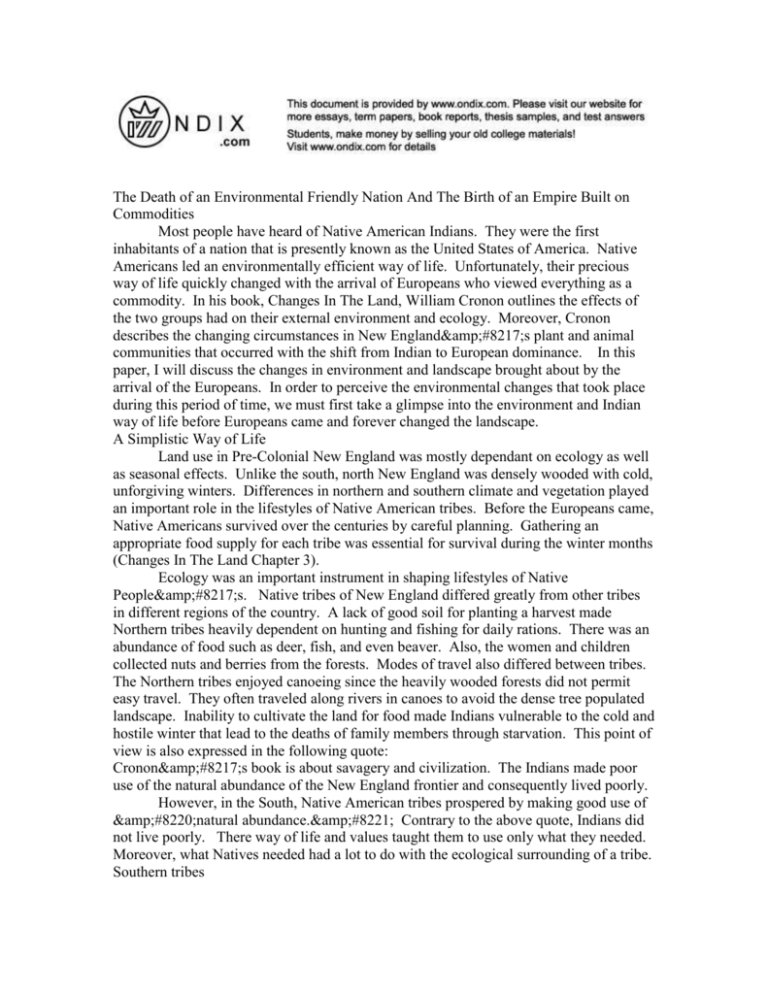
The Death of an Environmental Friendly Nation And The Birth of an Empire Built on Commodities Most people have heard of Native American Indians. They were the first inhabitants of a nation that is presently known as the United States of America. Native Americans led an environmentally efficient way of life. Unfortunately, their precious way of life quickly changed with the arrival of Europeans who viewed everything as a commodity. In his book, Changes In The Land, William Cronon outlines the effects of the two groups had on their external environment and ecology. Moreover, Cronon describes the changing circumstances in New England’s plant and animal communities that occurred with the shift from Indian to European dominance. In this paper, I will discuss the changes in environment and landscape brought about by the arrival of the Europeans. In order to perceive the environmental changes that took place during this period of time, we must first take a glimpse into the environment and Indian way of life before Europeans came and forever changed the landscape. A Simplistic Way of Life Land use in Pre-Colonial New England was mostly dependant on ecology as well as seasonal effects. Unlike the south, north New England was densely wooded with cold, unforgiving winters. Differences in northern and southern climate and vegetation played an important role in the lifestyles of Native American tribes. Before the Europeans came, Native Americans survived over the centuries by careful planning. Gathering an appropriate food supply for each tribe was essential for survival during the winter months (Changes In The Land Chapter 3). Ecology was an important instrument in shaping lifestyles of Native People’s. Native tribes of New England differed greatly from other tribes in different regions of the country. A lack of good soil for planting a harvest made Northern tribes heavily dependent on hunting and fishing for daily rations. There was an abundance of food such as deer, fish, and even beaver. Also, the women and children collected nuts and berries from the forests. Modes of travel also differed between tribes. The Northern tribes enjoyed canoeing since the heavily wooded forests did not permit easy travel. They often traveled along rivers in canoes to avoid the dense tree populated landscape. Inability to cultivate the land for food made Indians vulnerable to the cold and hostile winter that lead to the deaths of family members through starvation. This point of view is also expressed in the following quote: Cronon’s book is about savagery and civilization. The Indians made poor use of the natural abundance of the New England frontier and consequently lived poorly. However, in the South, Native American tribes prospered by making good use of “natural abundance.” Contrary to the above quote, Indians did not live poorly. There way of life and values taught them to use only what they needed. Moreover, what Natives needed had a lot to do with the ecological surrounding of a tribe. Southern tribes cultivated many crops in their fields due to fertile land. Fascinatingly, they burned down sections of woodland for better soil to grow vegetation. This vegetation grew attracting animals to an area to eat. This ingenious tactic provided crops and attracted animals for hunting. The southern tribes exercised more mobility because they could grow their own crops as well as hunt. As in most Native Indian cultures, the women worked in the fields while the men did the hunting. Winter did not take a heavy toll on the southern tribes because they generally accumulated more food for survival through winter months. Ownership of land was non-existent in Native American culture. Indians believed that they, as all things, belonged to the land. This belief was a major difference between Indians and Europeans (Natures Nation Chapter 2). Arrival of the Europeans The land as the Europeans found it was different in many ways then the land they left behind. Europeans viewed everything as a commodity as described in the following quote: As for trees the country yeeldeth sassafras a plant of sovereigne vertue for the French Poxe, and as some of the late have learnedly written good against the plague and many other maladies; Vines, cedars, okes, ashes, beeches, birch trees, cherie trees bearing fruit whereof wee did eate, hasels, wichhasels, the best wood of all toher to make sope-ashes withall, walnut-trees, maples, holy to make bird lime with, and a kinde of tree unknown to us bearing fruit like a small red Peare-plum. (Changes In The Land, pg. 21) Cheaib 4 Early accounts dating as far back as 1584, did not describe the landscape and forests accurately because these accounts were nothing more than lists. They were lists of commodities or resources for the interest of future undertakings. Europeans often made outrageous claims of abundance, which give us an indication of the land they had come from. The commodities they frequently wrote about were the scarce resources of Europe. Such claims included: There was enough forest that could allow a poor man to live comfortably throughout the entire winter; Rivers were filled with so many fish one could walk across their backs and not get wet; Enough deer for a man to kill one hundred a day; Turkeys were ten times the size as the ones in England. These all described scarce at commodities in England the time. Unfortunately, the early settlers had to survive the first winter before they could capitalize on the commodities. This proved to be a hard task that left half of the first settlers dead and the rest of them dependent on Native Americans. Early European Settlers Native Americans graciously supplied early settlers with food. Ungratefully, in return the settlers occupied lands cleared by natives and raided food from native gardens. The following quote in a misrepresentation of the true situation: European [Euro-Americans] had a higher use for the frontier abundance and soon had improved New England. Capitalism, as practiced in pre-1800 New England, made good ecological sense. Without the Indians the early settlers could not have survived in America. They depended on Indians for their clearings and food. Moreover, they did not make good ecological sense. “When Indians demonstrated maize to the struggling European settlers, the Indians were amused and revolted by the invader’s sloppy, even lazy, weeding and cultivation compared to neat, clean Indian fields.” This proves that Indians were the ones that made good ecological sense. They were self sufficient and only used what was needed to survive. Europeans were poorer frontiersmen, trappers, hunters, and farmers than the Indians, but they had developed techniques for managing other people. The true European art of conquering others was soon put to use on Indians. Different Temperaments, Talents, and Convictions Indians and Europeans differed in many ways. There first main difference is their beliefs on land and religion. Indians believed that they belonged to the land and the earth was their mother. On the other hand Europeans, who were of Christian faith; felt that they were placed on earth to conquer it. They believed that people own land rather than people are a part of the land. The second main difference was the role of families and in particular the role of men and women in each society. European settlers had their own set of fields to plant and harvest. In contrast, a whole Indian tribe often used one field that was divided among families. The role of a woman in Indian society was to tend to the crops as well as the children. The role of European women was as a homemaker. They cooked the meals, attended to the children and sewed clothing for the entire family. The main role of men in European society was to tend to the fields. The role of men in Indian society was to hunt for meat and fish. These differences led many settlers to believe that Indians were lazy because they put their women in the fields and went hunting which was considered a leisure event. However, the Indian women were efficient planters because they would cut away competing plants and weeds in order to get a better harvest. The Changing Landscape American growth began with the “abundance theory” that early settlers believed and portrait in their writings. Access to commodities fueled by the ever-growing European economy made growth a profitable venture for the settlers and nations involved. Unfortunately, this profit would be at the cost of Indians and the environment. At stake for the Indians was a their culture and their entire way of life. By the 19th century, many Indians were dying and being forced to move to unfamiliar territories. Europeans brought with them diseases such as small pox and the common cold that killed thousands of Indians. Indians where susceptible to the common diseases of Europe because their immune systems where unfamiliar with such diseases. As a result, entire villages where sometimes wiped out by a single case of small pox or a cold that contact with whites had induced. Moreover, these people where being forced to move to unfamiliar areas that brought about stress, starvation, and a dependence on Europeans that Indians were not used to. The Gold Rush of 1849 brought about massive expansion for whites and near extinction for Indians. In the movie The Way West, the Gold Rush is described as follows: In 1849, the Gold Rush sent hundreds of thousands of people rushing across the continent to California and Oregon. Thereafter, the ever-quickening pace of expansion would lead to a series of bloody confrontations between Native Americans and whites… ( The Way West, Episode 1) Cheaib 7 The gold rush was pivotal in driving out Indians from their lands. This was all done in the name of expansion and wealth. The gold rush merely marked the beginning of expansion, destruction and extinction to the Indian way of life. Since the first settlers set foot upon America, they have played a vital role in the destruction of the land as well as the people that existed here first, the Native Americans. Expansion has brought America a long way, but at what price? According to Carl Abbott, “We have traded something valuable in our land and people for every benefit of prosperity. Group oppression and the wasting of the environment are the parallel results of our commitment to rapid growth and of our tendency to undervalue anything which cannot be quantified,” (The Human and Environmental Costs of American Growth). This expansion and exhaustion of the environment and people must be controlled before it is too late. I do not want the burden of being the last generation to have an opportunity to do something about this global problem and fail. I would like to leave a this world knowing my grandchildren can live as happy as I have lived. Keywords: death environmental friendly nation birth empire built commodities most people have heard native american indians they were first inhabitants nation that presently known united states america native americans environmentally efficient life unfortunately their precious life quickly changed with arrival europeans viewed everything commodity book changes land william cronon outlines effects groups their external environment ecology moreover cronon describes changing circumstances england plant animal communities that occurred with shift from indian european dominance this paper will discuss changes environment landscape brought about arrival europeans order perceive environmental changes that took place during this period time must first take glimpse into environment indian life before europeans came forever changed landscape simplistic land colonial england mostly dependant ecology well seasonal effects unlike south north england densely wooded with cold unforgiving winters differences northern southern climate vegetation played important role lifestyles native american tribes before came americans survived over centuries careful planning gathering appropriate food supply each tribe essential survival during winter months land chapter ecology important instrument shaping lifestyles people tribes differed greatly from other tribes different regions country lack good soil planting harvest made northern heavily dependent hunting fishing daily rations there abundance food such deer fish even beaver also women children collected nuts berries from forests modes travel also differed between northern enjoyed canoeing since heavily wooded forests permit easy travel they often traveled along rivers canoes avoid dense tree populated landscape inability cultivate food made indians vulnerable cold hostile winter lead deaths family members through starvation this point view also expressed following quote cronon book about savagery civilization indians made poor natural abundance frontier consequently lived poorly however south american prospered making good natural abundance contrary above quote live poorly there values taught them only what they needed moreover what natives needed ecological surrounding tribe southern cultivated many crops their fields fertile fascinatingly burned down sections woodland better soil grow vegetation vegetation grew attracting animals area ingenious tactic provided crops attracted animals hunting southern exercised more mobility because could grow crops well hunt most indian cultures women worked fields while hunting winter take heavy toll because generally accumulated more survival through months ownership existent culture believed things belonged belief major difference between natures nation chapter arrival found different many ways then left behind viewed everything commodity described following quote trees country yeeldeth sassafras plant sovereigne vertue french poxe some late have learnedly written good against plague many other maladies vines cedars okes ashes beeches birch trees cherie trees bearing fruit whereof eate hasels wichhasels best wood toher make sope ashes withall walnut maples holy make bird lime kinde tree unknown bearing fruit like small peare plum cheaib early accounts dating back describe forests accurately because these accounts were nothing more than lists were lists commodities resources interest future undertakings often outrageous claims which give indication come commodities frequently wrote about scarce resources europe such claims included there enough forest could allow poor live comfortably throughout entire rivers filled fish could walk across backs enough deer kill hundred turkeys times size ones these described scarce time unfortunately early settlers survive first before capitalize proved hard task left half settlers dead rest them dependent americans early european settlers graciously supplied ungratefully return occupied lands cleared natives raided gardens following misrepresentation true situation european euro higher frontier soon improved capitalism practiced ecological sense without have survived america depended clearings moreover make ecological sense when demonstrated maize struggling amused revolted invader sloppy even lazy weeding cultivation compared neat clean fields proves ones sense self sufficient only used what needed survive poorer frontiersmen trappers hunters farmers than developed techniques managing other people true conquering others soon different temperaments talents convictions differed ways main difference beliefs religion believed belonged earth mother hand christian faith felt placed earth conquer believed rather than part second main difference role families particular role women each society plant harvest contrast whole tribe often used field divided among families woman society tend well children homemaker cooked meals attended children sewed clothing entire family main society tend hunt meat fish these differences believe lazy went which considered leisure event however efficient planters would away competing plants weeds order better harvest changing growth began theory portrait writings access fueled ever growing economy growth profitable venture nations involved unfortunately profit would cost stake culture entire century dying being forced move unfamiliar territories brought them diseases such small common cold killed thousands where susceptible common diseases europe immune systems where unfamiliar diseases result villages where sometimes wiped single case small contact whites induced being forced move unfamiliar areas brought stress starvation dependence used gold rush massive expansion whites near extinction movie west gold rush described follows gold rush sent hundreds thousands rushing across continent california oregon thereafter ever quickening pace expansion would lead series bloody confrontations between whites west episode cheaib pivotal driving lands done name expansion wealth merely marked beginning destruction extinction since foot upon america played vital destruction existed here long price according carl abbott traded something valuable every benefit prosperity group oppression wasting parallel results commitment rapid growth tendency undervalue anything which cannot quantified human environmental costs exhaustion must controlled late want burden being last generation opportunity something global problem fail like leave world knowing grandchildren live happy lived Keywords General: Essay, essays, termpaper, term paper, termpapers, term papers, book reports, study, college, thesis, dessertation, test answers, free research, book research, study help, download essay, download term papers

